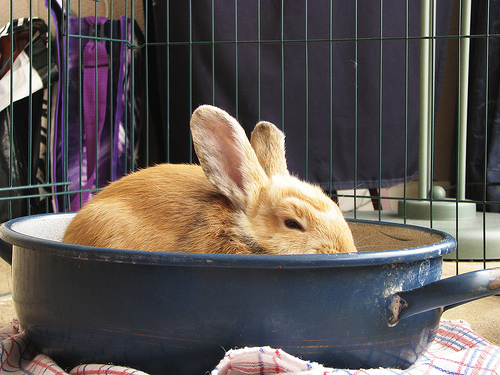
Most rabbit owners will have heard at some point that their rabbit should never be given antibiotics…that antibiotics can be fatal to a rabbit. As is the case with any kind of animal, including humans, some drugs can indeed have life-threatening side effects whereas other drugs are extremely beneficial to the health of the animal. It is important as a responsible pet owner to be aware of some of the drugs that should not be used on your rabbit.
Is it true that penicillin should never be given to a rabbit?
Penicillin is a potentially toxic drug for rabbits because it upsets the gut flora (micro-organisms living in the intestines), leading to an overgrowth of the bacteria Clostridia. Clostridial species of bacteria secrete potentially fatal toxins that are absorbed by the gut, a condition known as enterotoxaemia. Penicillin, and related compounds such as ampicillin and amoxicillin, should generally be avoided as they can result in a fatal gastroenteritis. However, there is one disease that necessitates the use of penicillin. Rabbit syphilis, a rare disease that is not the same as human syphilis, is normally treated with penicillin.
Are there any drugs besides penicillin that are particularly unsafe for rabbits?
There are a number of antibiotics, as well as other drugs, that are considered unsafe for use in rabbits.
• Clindamycin
• Lincomycin
• Vancomycin
• Erythromycin
• Spiramycin
• Fipronil (Frontline)
Antibiotics that are given orally are more likely to harm gut bacteria than injectable antibiotics.
Are other antibiotics safe to use in rabbits?
As mentioned before, there are some safe drugs for rabbits, and some that aren’t. The antibiotics in the penicillin family are particularly dangerous because they upset the rabbit’s normal gut flora, resulting in gastroenteritis. There are many antibiotics that rarely cause any changes to the bacteria in the rabbit’s gut. Commonly used antibiotics that are relatively safe for rabbits include:
• Enrofloxacin (Baytril)
• Trimethoprim sulphonamides
• Chloramphenicol
• Metronidazole
This is just a short list of widely used antibiotics – they are many more drugs that are considered safe to use in rabbits.
What are the signs that my rabbit has antibiotic-induced gastroenteritis?
Signs of illness usually begin 3-5 days after the start of antibiotic therapy. Rabbits with enteritis can show any of the following symptoms:
• Depression
• Lack of appetite
• Stops drinking
• Distended abdomen
• Painful abdomen
• Diarrhoea (may contain blood and/or mucus)
If you are concerned that your rabbit is showing signs of gastroenteritis, take it to a vet immediately. This can be a life-threatening condition that needs to be treated in a veterinary hospital.
How can I prevent my rabbit from getting gastroenteritis?
Not all rabbits will develop gastroenteritis when given unsafe antibiotics. However, it is important to always follow the directions from your veterinarian for administering antibiotic therapy. Also, rabbits should always be fed on a high-fibre diet, whether they are on antibiotics or not. Commercial pelleted foods are low in fibre, high in fats and simple carbohydrates. Bacteria such as Clostridia thrive on simple carbohydrates and sugars.
(photo: hanss)